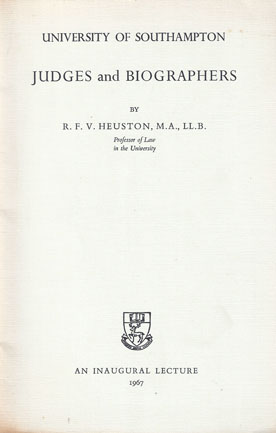
Out of Print
Mr Vice-Chancellor, your office obliges you to attend many lectures, and I daresay that as a distinguished man of science you have often, while listening, recalled the science of pantopragmatics.
To you pantopragmatics is familiar, having been described thus by Thomas Love Peacock just over a century ago.1 "Like most other science, it resolves itself into lecturing, lecturing, lecturing, about all sorts of matters, relevant and irrelevant: one enormous bore prating about jurisprudence, another about statistics, another about education, and so forth." Today it is the turn of an enormous bore to prate about jurisprudence, in one of the larger meanings which that term can bear.
An inaugural lecture is entitled to take many forms. One I disclaim immediately-that kind of lecture which, as has been said, should properly be called "My Plans for the Law School". My lecture is rather within the orthodox tradition which expects of a professor an account of the state and prospects of a major subject within his field of interests which is not so technical as to be incomprehensible outside his own Faculty.
So the subject chosen is one on the borders of law, history and politics. It is a general survey of the problems involved in writing a biography of a modern judge of an English superior court-and, in particular, of a Lord Chancellor.
The task is interesting for a number of reasons. The common law, as Roscoe Pound observed in one of his most stimulating essays, is largely the history of the men who made it. So Holdsworth's massive account of the technical doctrines of English law over six centuries is interspersed with lengthy memoirs of the leading judges and prac-titioners.
English law is an important national institution which has influenced much of the world, and if, like most English institutions, it is suffering today from a lack of self-confidence, anything which can throw light on its defects, or even on its merits, is worth serious study.
...page 1 An Inaugural Lecture Delivered at the University on 24th, January 1967 by R.F.V. Heuston, M.A., LL. B Professor of Law in the University